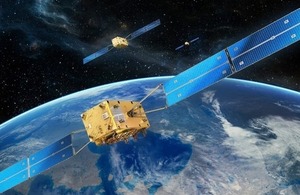Galileo satellites are go
The first two full operating capability Galileo satellites have been launched on a Soyuz rocket from the Guiana Space Centre, French Guiana.

Artist's impression of Galileo FOC satellites. Credit: ESA.
These were to be the 5th and 6th satellites to join the EU’s growing GNSS constellation, but unfortunately the satellites did not reach the correct orbit. Galileo is Europe’s global navigation satellite system currently in development, owned by the European Commission (EC). The EC has requested the full details of the launch incident, together with a schedule and an action plan to rectify the problem.
The UK has played a vital role in both the policy and the technical development of Europe’s global navigation satellite system. Galileo is owned by the EC with the European Space Agency (ESA) acting in partnership as the technical design and procurement authority. Galileo’s key differentiator from other similar systems is that it is a civil system under civil control. Designed to be inter-operable with GPS, the US global satellite navigation system, receivers that are equipped with the right chipsets will, in future, be able to utilise signals from both systems to provide a more accurate and reliable global positioning service than by using GPS or Galileo alone.
The first stages of the Galileo Programme’s capability hopes to be demonstrated in 2015 but as the constellation is built-up, new services will be tested and made available to reach Full Operational Capability (FOC). The FOC Galileo services will include:
- Open Service
- free of charge and dedicated to consumer applications and general interest navigation
- Public Regulated Service
- highly restricted service for government applications such as law enforcement
- more robust signal to protect it from jamming and deliberate interference
- Commercial Service Accessible only via payment of a fee to an operator
- used by professional consumers prepared to pay for superior performance
- Search and Rescue Service
- relays the location of distress signal to the nearest rescue centre, and informs the source that that signal has been received and that help is on its way
- compatible with existing international satellite-based search and rescue systems